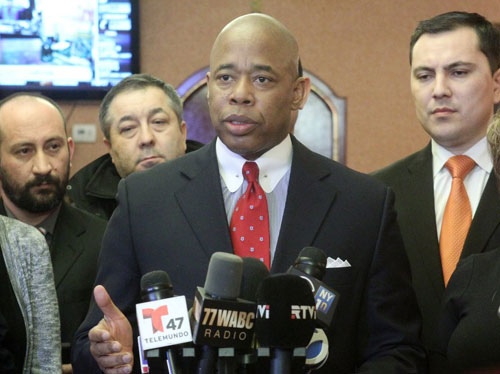One of the men arrested on terrorism charges on Wednesday for his plans to join the Islamic State raised concerns among his fellow Muslims with his interpretation of Islam, according to a local community leader who knew one of the suspects.
Terrorism suspect Abror Habibov, who was originally from Uzbekistan and divided his time between Brighton Beach and Florida on an expired visa, held outdated and extreme religious views that some worried could lead to trouble.
“There were concerns about the way he understood Islam,” said Farhod Sulton, the president of the Vatandosh Uzbek American Federation. “There is modern Islam and there is ultra orthodox, and the way they see and the way they understand Islam is totally different from the modern Islam.”
Habibov was arrested Feb. 25 along with Midwood residents Abdurasul Juraboev, a fellow Uzbek, and Akhror Saidakhmetov, a Kazakhstan native. The men were charged with material support for terrorism based on allegations that Juraboev offered to bomb Coney Island and assassinate President Obama and Saidakhmetov — arrested just before boarding a flight to Turkey — was planning to join the jihadist militant group. Habibov, arrested in Florida, was allegedly funding the travel plans.
Borough President Adams held a press conference with local Muslim leaders at Oasis Café in Sheepshead Bay on Feb. 26 to discuss the arrest and the radicalization of young Muslim men who may feel out of place in America.
There are approximately 50,000 Uzbek immigrants in New York and Sulton stressed the individuals who were arrested do not reflect the Central Asian community. Sulton said he was shocked when he heard the news, and that the last time he saw Havibov, it seemed like he had very typical goals.
“He wasn’t crazy then — he was just normal guy, wants to build business and get ahead,” he said, adding that his fringe views on Islam may have led him to associate with extremists who radicalized him.
Adams said he wants to try and short-circuit that process by connecting young immigrants who may feel alienated in America with Brooklynites to prevent them from turning to extremists from the Internet for guidance.
“Many of these young men don’t understand how to be part of the American culture if someone is not there showing them that process,” said Adams. “We want to be proactive to go into the communities, establish relationships with the communities, identify the young people and have them talk to young people from America and from Brooklyn so they can understand that the hate they are hearing through the Internet is not the hate that America is.”
Sulton said he has been working on establishing programs to prevent young men in his community from turning to radical groups, and he reiterated that the men arrested Wednesday represent only a tiny fraction of the Uzbek and Kazakh populations, so he hopes the communities are not stigmatized because of these individuals’ actions.
“We were concerned that these people may destroy our reputation,” he said.


























